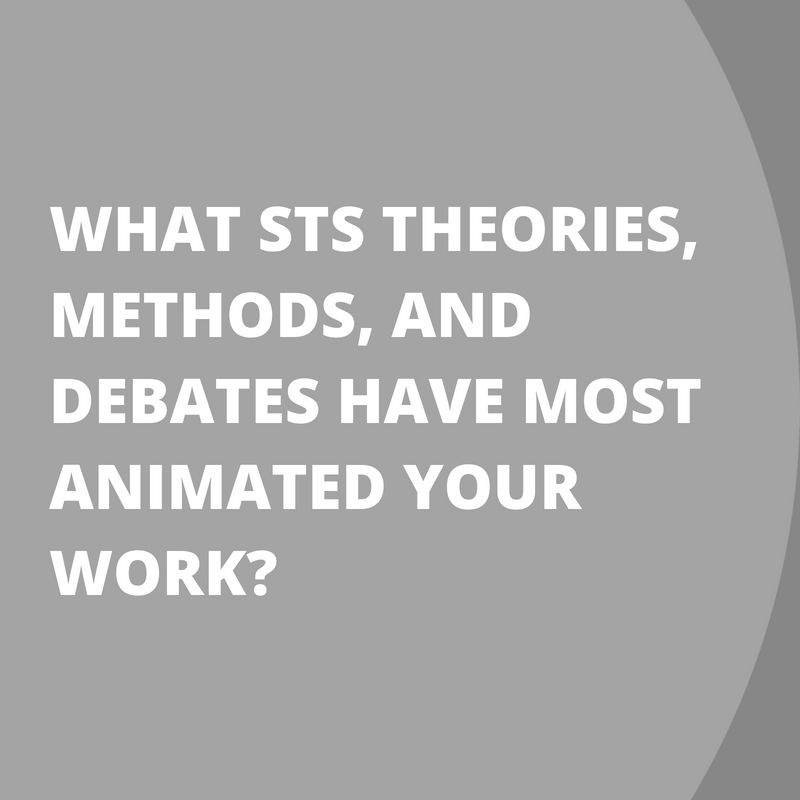
"The STS theories/debates that most animate my work can be assembled in three categories: a. Theories about the entanglement of humans and machines. They help me explore the effects of digital technologies without foundering into dichotomous thinking, which easily leads to either techno-utopianism, or to moral panic. Donna Haraway has been inspirational but also Madeleine Akrich, or Michel Callon among others. b. Work that explores how space is being designed, crafted, and inhabited is very meaningful to me. I value discussions of how space does not preexist, but actually emerges through specific practices, that give it form and consistence. The challenge is to be able to think space in an experimental, non-conservative, way. c. Debates around the articulation of meaning and matter, and specifically of ordering processes (culture, language, myths, etc.) and the indeterminacy of life itself, if we may say. I am sensitive to concepts capable of engaging with forces and intensities – technological, but also economic, and political – that constitute (and spoil) the worlds we are attached to. This seems like a strategic location to theorize power and resistance in these troubled times."
"My teaching and activist organizing in and out of US prisons pulls from a reservoir of STS concepts and theories such that words and works can pass through the wire and concrete fences that define the spaces of the prison industrial complex.
I’ve found discussions about: the degree to which there is structural stability of scientific knowledge; technological neutrality and the significance of social meaning embedded in technologies; the ethical impact our onto-epistemological capacities have on life, all to be animating my current work."
"I primarily draw from feminist STS work on materialities, assemblages, and affects. I'm interested in how systems of scientific knowledge production produce embodied subjectivities."
"I’m interested in what are usually called (in STS and sociology of medicine) contested illness categories, meaning those conditions that, in Joe Dumit’s (2006) words, are “illnesses you have to fight to get.” Many of the conditions that I’ve researched or covered in classes—autism spectrum disorder, unexplained colony losses in honey bees, addiction and mental illness—matter differently to different groups of people, with consequences for how they are treated and who gets cared for. More generally, I’m fascinated by how emotion and displays of emotion are used in decisions about whose observations and testimony are considered credible by scientists and members of the public. I was introduced to feminist epistemologies (e.g. work by Sandra Harding, Donna Haraway, Karen Barad) at a formative moment, as well as work in the rhetoric of science (Richard Doyle, Lily Kay, Evelyn Fox Keller), and writing by those thinkers in many ways remain guides and touchstones."
"The animal geographies and multispecies ethnographies that inform Human-Animal Studies."
"My work most obviously influenced by STS is my 2003 book Consuming the Caribbean which traces the dense assemblages of “human, floral, faunal, capital, visual and informational movements that constituted (and constitute) the transatlantic world” (p.21). As anthropologist Bill Maurer points out in reviewing the book, it has close affinities with theoretical approaches in science studies, and draws on theorists such as Bruno Latour and Sarah Franklin to study how “networked agents, objects, and knowledges create new agents, objects, and knowledges.” I also try to combine STS approaches with critical theories of biopolitics, coloniality, race, sex, and gender, taking inspiration from theorists such as Hortense Spillers, Katherine McKittrick, Simone Browne, and Sylvia Wynter."
"My work is inspired by feminist STS work that investigates the traffic between political economy, cultural contexts, technoscience, and institutional settings."